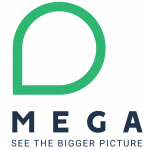L’Industrial Enterprise Architecture Day est le nouvel évènement dédié aux problématiques des groupes industriels ayant engagé une transformation et considérant l’ingénierie système comme un axe majeur de progrès.
Une journée de partage d’expériences, de bonnes pratiques et d’échanges sur les applications de la vision systémique à la gouvernance des organisations industrielles. Une journée pour les acteurs clés du manufacturing, les directeurs industriels, les concepteurs et responsables du pilotage industriel.
IEA day en quelques mots
Avec l’aide des représentants de grandes sociétés industrielles (cf. comité d’organisation), CESAM Community organise cette année un évènement dédié aux problématiques des groupes industriels ayant engagé une transformation numérique de leurs outils de production.
Les technologies mises en place dans le cadre de l’Industrie 4.0 (ou industrie du futur) comme les jumeaux numériques, l’Internet des objets (industriel), le Big Data, l’intelligence artificielle, le Cloud et les robots (voire les cobots) sont de plus en plus répandues, utilisées, interconnectées et sont surtout capables de communiquer entre elles et d’agir de manière autonome. L’échange d’informations permet d’optimiser les processus de fabrication et d’améliorer la flexibilité des moyens de production. L’Industrie 4.0 est donc la condition technique préalable à une production intelligente qui, par exemple, se configure de manière autonome et est capable de fabriquer un produit en petites séries, conçu selon les spécifications de différents clients, au prix d’une production standardisée. L’Industrie 4.0 apparait comme un véritable levier de la transformation numérique des entreprises.
Mais la transformation de nos industries historiques vers cette nouvelle industrie fait face à un certain nombres de défis et d’écueils technologiques, organisationnels et économiques.
Dans cette conférence, nous aborderons ces problématiques, ces défis ou réussites à travers quelques thèmes forts : les nouvelles tendances dans la production, l’optimisation des processus industriels, la cybersécurité, la traçabilité et la sécurité, la transformation numérique et enfin les enjeux environnementaux.
Une journée de partage d’expériences, de bonnes pratiques, d’échanges et de réseautage pour les acteurs clés du manufacturing, les directeurs industriels, les concepteurs et responsables du pilotage industriel.
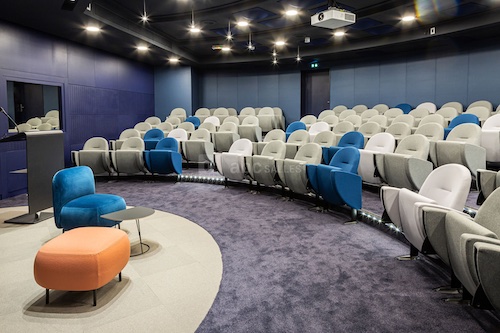
La première édition de l’Industrial Enterprise Architecture Day aura lieu le 9 juin 2022 au Business Center Edouard VII.
Un cadre unique réservé à seulement 100 personnes sur inscription ! (les autres participants peuvent accéder au direct de la conférence en ligne)
Thèmes | Speakers | |
9h00 | Keynote d'ouverture - Industrie du futur - Vision de la transformation de l’industrie au niveau européen | Joël Rosenberg, Directeur France, EIT Manufacturing |
Session #1 : Nouvelles tendances dans la production | ||
10h00 | Evolutive Vaccines Facilities : the answer from Sanofi Pasteur to Vaccine manufacturing new paradigms | Bruno Tricoire, Head of Tech Transfers, SANOFI |
10h30 | L’impression 3D metallique, une nouvelle façon de produire digital & big data native | Sébastien Devroe, Chief Technical Officer, AddUp |
11h00 | Pause café + networking | |
Session #2 : Transformation digitale | ||
11h30 | Presentation of the Factory 4.0 project aimed at introducing smart technologies in factories for end-to-end digital continuity | François Planchot, Head of Digital & IT governance, ArianeGroup |
12h00 | Digital twins of industrial assets: cost efficient and low risk implementation at scale | Yaroslav Logachev, IoT/AI Product Manager, ATOS |
12h30 | Lunch | |
Session #3 : Cybersécurité (IIoT) | ||
14h00 | L'application systématique et méthodologique de cyber sécurité au sein de la transformation des systèmes Industriels | Firas Sadek, Enterprise Security Architect, AIRBUS |
14h30 | La Cyber-Sécurité en environnement Industriel | Didier Bourguignon, Fondateur, Security Data Network |
15h00 | Les nouvelles architectures d’automatisme : quel impact sur la cybersécurité ? | Jean-Pierre Hauet, Président, ISA France |
15h30 | Pause café + networking | |
Session #4 : Optimisation des processus industriels | ||
16h00 | How the new process control will accelerate the bioprocesses with the new sensors and the digital implementation? | Eric Calvosa, Senior Project Coordinator, SANOFI |
16h30 | Automated quality inspection, the power of AI and Computer Vision to boost industrial performance | Pierre Jarrige, Business Development & Innovation, ATOS |
17h00 | Keynote de cloture - Systemic digital twins | Daniel Krob, Président, CESAMES |
18h00 | Mot de clôture | |
Formule Hybride :
Le 9 juin en présentiel ou en distanciel, c’est vous qui choisissez !
-
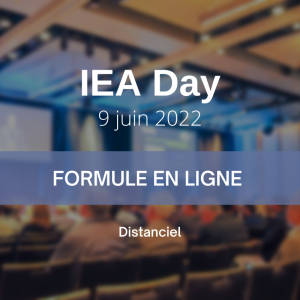
IEA Day | Formule en ligne
30.00 € En savoir plusIEA Day | Formule en ligne24 février 20227 juillet 2022 -
Promo !

IEA Day | Formule présentielle
Le prix initial était : 240.00 €.99.00 €Le prix actuel est : 99.00 €. En savoir plusIEA Day | Formule présentielle24 février 20227 juillet 2022
Vision de la transformation de l’industrie au niveau européen

The European Institute of Innovation and Technology (EIT) strengthens Europe’s ability to innovate by powering solutions to pressing global challenges and by nurturing entrepreneurial talent to create sustainable growth and skilled jobs in Europe. The EIT is an EU body which is an integral part of Horizon Europe, the EU Framework Programme for Research and Innovation. The Institute supports the development of dynamic pan-European partnerships – EIT Knowledge and Innovation Communities – among leading companies, research labs and universities.
EIT Manufacturing is supported by the European Institute of Innovation and Technology (EIT), a body of the European Union. It is one of eight innovation communities within EIT. EIT Manufacturing’s main goal is to bring European stakeholders focused on manufacturing together in innovation ecosystems that add unique value to European products, processes and services and inspire the creation of globally competitive and sustainable manufacturing. EIT Manufacturing brings together more than 70 members (universities, research institutes and business).
Evolutive Vaccines Facilities : the answer from Sanofi Pasteur to Vaccine manufacturing new paradigms

Sanofi is investing over 500 M€ in France for new facilities for Development and Manufacturing of Vaccines. This includes the Evolutive Vaccines Facility at Neuville-sur-Saone.
The same facility is being built in Singapore. EVF is the Sanofi Pasteur answer to the extraordinary acceleration the vaccine manufacturing is taking.
EVF is a modular facility designed to Launch new vaccines, with flexibility, agility, and rapidity adapt to the evolution of the needs through multiproduct & multipurpose operations covering several process platforms. EVFs are expandable to ensure ability to quickly ramp-up for future needs.
L’impression 3D metallique, une nouvelle façon de produire digital & big data native

AddUp was born in 2016 from the desire of two major French industrial groups, Michelin and Fives, to create an important player in the field of metal additive manufacturing. The AddUp Group offers a catalogue of multi-technology production systems, which includes the FormUp® range (robust and open PBF machines, available with multiple spreading devices) as well as the Magic and Modulo lines (industrial DED machines). AddUp is one of the largest design and production office in Europe, the group has a multi-technological, multi-supplier and multi-material production platform, which allows customers to have parts manufactured on demand, for small and medium series, and to order studies to choose the best technology for their application.
To support its activities parts & machine supplier based on new technologies, AddUp develops digital tools able to handle massive manufacturing data taking into account all aspect, security, exploration, data learning at machine level but also more widely at workshop, and finally during all parts/machine lifecycle. These challenges will be presented.
Digital twins of industrial assets: cost efficient and low risk implementation at scale

Digital twins are complex, expensive to build and maintain. It becomes especially evident when companies start moving beyond PoC, to a large scale roll out. At Atos we are working on an industrialized approach to build, roll out and continuously maintain digital twins across multiple type of equipment, several production lines and sites. During the session we will discuss challenges of such implementation at scale and solutions that help resolving them.
L'application systématique et méthodologique de cyber sécurité au sein de la transformation des systèmes Industriels

Dans cette présentation, après l’introduction des fonctions de Corporate Security, Digital Security, et Enterprise Security Architecture au niveau du groupe d'Airbus, Firas Sadek abordera l’importance et l’impact de l’urbanisme et de la standardisation de sécurité dans des organisations de grande taille. Il évoquera les avantages de cascader la sécurité dans les projets industriels et la nécessité de l'adoption du concept de champions de la sécurité et de l'évangélisation au sein des équipes non chargées de la sécurité. Seront présentées ensuite les règles d’or et les bonnes pratiques de l’IIoT, ces règles n’étant pas spécifiques à Airbus, mais applicables dans toutes les industries. Il conclura par le partage des facteurs-clés de succès.
La Cyber-Sécurité en environnement Industriel

Cette session a pour objectif de faire un rapide tour d’horizon des menaces cyber qui pèsent sur les entreprises et particulièrement les risques qu’elles font peser sur les systèmes industriels, les difficultés rencontrées dans la sécurisation de ces environnements spécifiques et comment y remédier.
Les nouvelles architectures d’automatisme : quel impact sur la cybersécurité ?

Les nouvelles architectures d’automatisme qui sont à la base d’Industrie 4.0 reposent sur de nouveaux concepts : l’IIoT, le cloud computing et l’edge computing. Ces nouvelles architectures visent à améliorer l’efficacité des entreprises en leur offrant un accès beaucoup vaste aux données, un traitement dans le cloud ou dans le niveau intermédiaire de l’edge et un accès délocalisé aux résultats. Ce faisant, la surface d’attaque face aux cyber-attaques se trouve considérablement élargie et les principes classiques de défense par zones de sécurité ne sont plus suffisants. Il convient de les compléter par de nouvelles approches en cours d’intégration dans le dispositif normatif de la cybersécurité, en l’occurrence l’ISA/IEC 62443.
How the new process control will accelerate the bioprocesses with the new sensors and the digital implementation?

The pharmaceutical industry environment is changing rapidly and the majority of new drugs reaching the market in the coming years will be biomedicines rather than chemical molecules. This results in a high demand in developing bioprocesses that are much more complex than for chemicals. This evolution is also highly impacted by the implementation of Digital, from R&D development through all phase 1, 2 and 3 validation stages and up to commercialization. The pandemic context as well as the desire for national independence have amplified this need. Many internal and collaborative initiatives have been launched to address these challenges. the presentation of the Calipso collaborative project lead by Sanofi will demonstrate how we can accelerate development and increase process productivity. A three-step approach is proposed. Firstly, measurement sensors targeted for key process points will be developed with CEA Leti and Centrale Supelec. In parallel, a dynamic database will be set up in collaboration with CG, CS, Ypso facto partners. As USP/DSP processes are modeled using mechanistic and hybrid approaches, all the data will be simultaneously used to recontrol the processes. The objective of this presentation will be to show how these new developments fit within the highly regulated environment of the Pharma Industry by using QBD (Quality By Design) and PAT (Process Analytical Technology).
Automated quality inspection, the power of AI and Computer Vision to boost industrial performance

To reduce costs of non quality, it is important for manufacturers to identify non conformities as early as possible in the industrial process. This enables them to better anticipate on repair / rework and deliver their customers with state of the art products. However, those controls require skilled manpower and can induce delays in the manufacturing process. AI and Computer Vision bring power to perform those controls in a repeatable and robust way so industrials can continue to deliver high valuable products with no impacts on the delivery schedule.
Systemic digital twins
Digital twins are key tools that support industry digital transformation. However, most of innovations in the area of digital twins for the industry only focus on improvement & deployment of new IOT or digital mockup technology. We do however believe that the real value of a digital twin technology is of functional nature, by allowing to better understand and predict the functional behavior of an industrial enterprise. We shall therefore present a new approach, based on the formal modeling language Sigma that we developed and on a new world model, for efficiently modeling & simulating industrial enterprises within their environment through systemic digital twins. The approach will be illustrated on the examples of a logistics ecosystem and of a submarine mine in the North sea.
AIRBUS

ARIANEGROUP
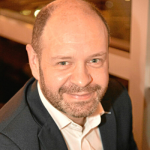
ATOS
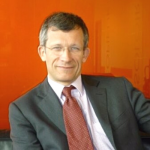
BOUYGUES CONSTRUCTION

CESAMES
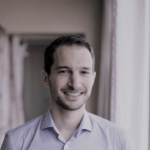
CESAMES
FIVES

MEGA INTERNATIONAL

POLEPHARMA

RENAULT

SAFRAN LANDING SYSTEMS

VINCI
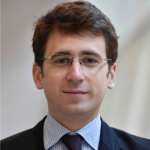
Business Center Edouard VII
23 Square Édouard VII, Paris 75009
Transports en commun :
Station Havre-Caumartin (métro 3,9)
Station Opéra (métro 3,7,8)
Station Auber (RER A)
Voiture :
Q-Park Edouard VII – Olympia – Haussmann


